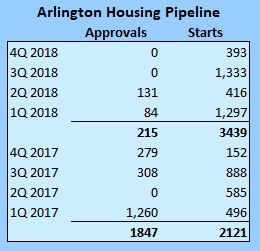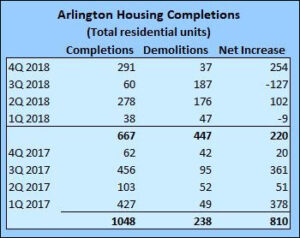The worst fears of Amazon critics are coming true. Housing prices are becoming increasingly unaffordable — even before Amazon sets up shop at its HQ2 facility in Arlington and floods the region with 25,000 employees.
The average home price in Arlington County jumped 7% in the past year to $713,000, as investors poured into the market in anticipation of Amazon’s arrival, reports the Washington Post. Inventories are so sparse that some popular Zip codes in Arlington and Alexandria show no homes for sale at all.
Alexandria saw a comparable increase in average home prices, while Fairfax County saw a year-over-year gain of 6%. Said Terry Clower, director of George Mason University’s Center for Regional Analysis: “This is a market response to the Amazon HQ2 announcement, with investors competing with residents for a shrinking number of homes for sale.”
In a functioning real estate market, prices act as a signal for the allocation of capital. A surge in home prices would be matched by a surge in home building as developers and builders. But, as seen in the table above, based on Arlington County permit statistics, the supply of housing is increasing negligibly. In 2016 the county’s housing stock stood at 111,549 units. According to Arlington County permitting data, the increase in housing units (completions minus demolitions) was only 810 units in 2017 and a negligible 220 units in 2018 — roughly a 1% increase in the housing stock over two years.
What’s going on here? Are developers and home builders insensate to the growing gap between the supply and demand of housing? Or could we be looking at the wrong numbers? After all, it takes time after building permits are issued to actually complete construction of a dwelling. Perhaps there is a flurry of housing construction in the pipeline.
Let’s see. Here are the numbers for housing “starts” and “approvals” for the past two years.

There has been a fairly significant increase in the number of housing “starts” — nearly 5,500 units over the past two years. However, those “starts” have not translated into a remotely comparable number of completions. I cannot explain the discrepancy. If the Washington Post wants to dig deeper into the dynamics of Northern Virginia’s housing market, it might seek to understand these statistics.
What does seem reasonably clear, however, is that the number of new residential housing “approvals” was meager in 2017, even weaker in 2018, and came to complete halt in the second half of 2018. What does this mean? Did developers simply submit very few proposals in 2018? Was the zoning board hostile to new projects? Is there some other explanation entirely?
As I have said repeatedly, the phenomenon of sky-rocketing housing prices in Arlington, Alexandria, and Fairfax County is readily understood in terms of supply and demand. Thanks to the region’s dynamic economy, demand is increasing faster than a lagging supply. Indeed, the gap is the greatest in Northern Virginia’s urban core, where demand is strongest.
For whatever reason, the supply of housing in Arlington County is inelastic — unresponsive to surges in demand. A simplistic explanation would point to the lack of undeveloped land to build upon. But that doesn’t explain why developers are unwilling or unable to recycle land of marginal value (used car lots, aging malls and shopping centers, outdated office parks, long-in-the-tooth neighborhoods of tract housing) into higher density, mixed-use projects of the type that are currently in vogue.
Trying to solve the emerging housing crisis through direct public and private subsidies for low-income households is a fool’s errand. Public authorities can’t possibly build enough workforce housing at $350,000 per unit to make a difference. Arlington, Alexandria and other inside-the-Beltway localities need to increase the supply of housing. If they fail, Arlington will displace the middle class and create armies of homeless like San Francisco and Los Angeles, with all the attendant social ills those cities seem so helpless to solve.


Leave a Reply
You must be logged in to post a comment.